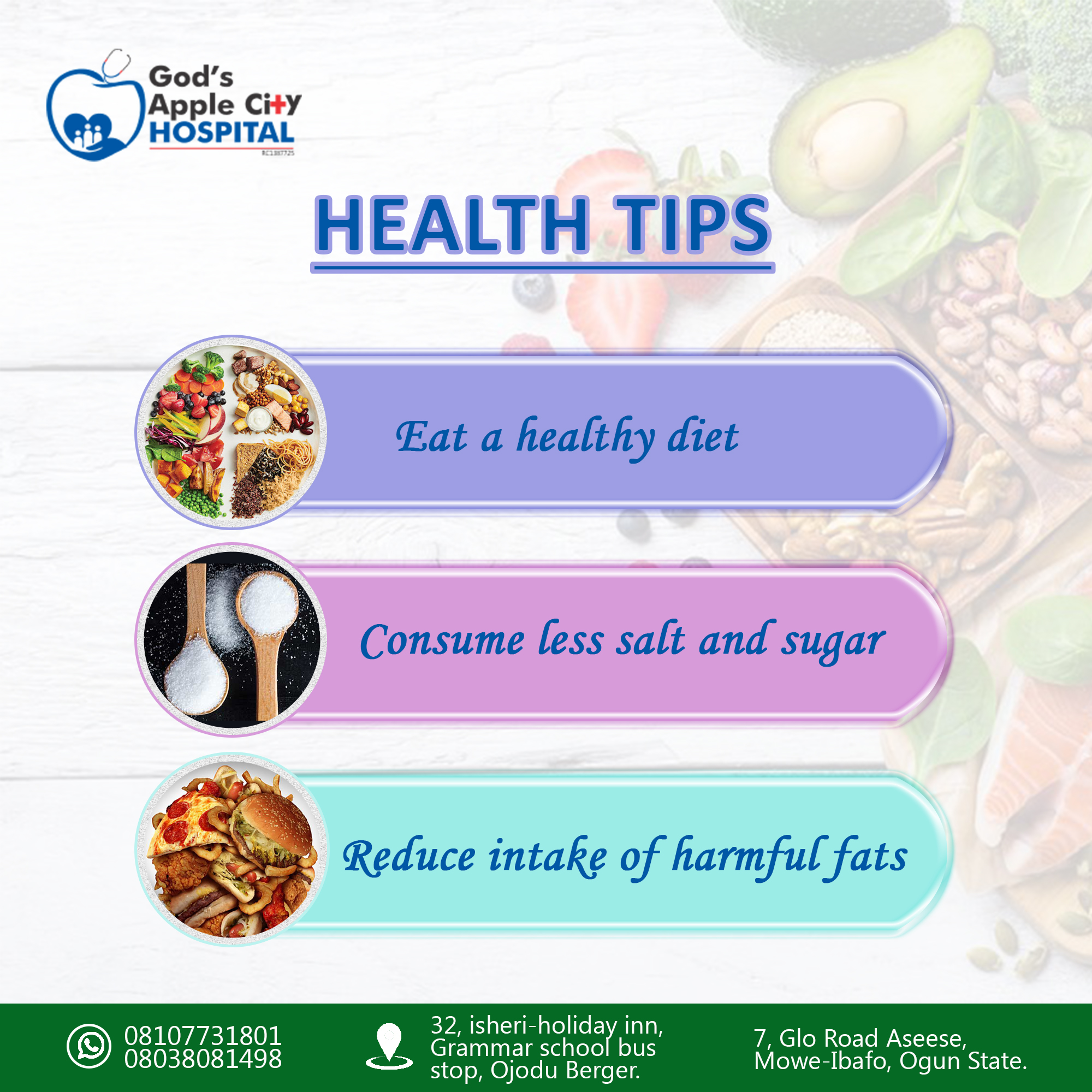Health tips
 oladroye35520
4
January
2022
oladroye35520
4
January
2022
Health tips
1.Eat a healthy diet
Eat a combination of different foods, including fruit, vegetables, legumes, nuts and whole grains. Adults should eat at least five portions (400g) of fruit and vegetables per day. You can improve your intake of fruits and vegetables by always including veggies in your meal; eating fresh fruit and vegetables as snacks; eating a variety of fruits and vegetables; and eating them in season. By eating healthy, you will reduce your risk of malnutrition and non-communicable diseases (NCDs) such as diabetes, heart disease, stroke and cancer.
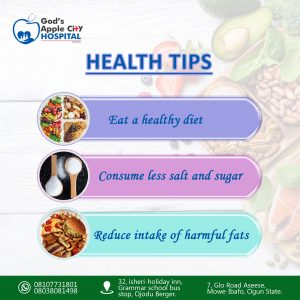
2. Consume less salt and sugar
Most people get their sodium through salt. Reduce your salt intake to 5g per day, equivalent to about one teaspoon. It’s easier to do this by limiting the amount of salt, soy sauce, fish sauce and other high-sodium condiments when preparing meals; removing salt, seasonings and condiments from your meal table; avoiding salty snacks; and choosing low-sodium products.
On the other hand, consuming excessive amounts of sugars increases the risk of tooth decay and unhealthy weight gain. In both adults and children, the intake of free sugars should be reduced to less than 10% of total energy intake. This is equivalent to 50g or about 12 teaspoons for an adult.
3. Reduce intake of harmful fats
Fats consumed should be less than 30% of your total energy intake. This will help prevent unhealthy weight gain and NCDs. There are different types of fats, but unsaturated fats are preferable over saturated fats and trans-fats. The preferable unsaturated fats are found in fish, avocado and nuts, and in sunflower, soybean, canola and olive oils; saturated fats are found in fatty meat, butter, palm and coconut oil, cream, cheese, ghee and lard; and trans-fats are found in baked and fried foods, and pre-packaged snacks and foods, such as frozen pizza, cookies, biscuits, and cooking oils and spreads.
4. Avoid harmful use of alcohol
There is no safe level for drinking alcohol. Consuming alcohol can lead to health problems such as mental and behavioral disorders, including alcohol dependence, major NCDs such as liver cirrhosis, some cancers and heart diseases, as well as injuries resulting from violence and road clashes and collisions.
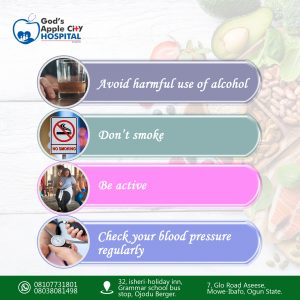
5. Don’t smoke
Smoking tobacco causes NCDs such as lung disease, heart disease and stroke. Tobacco kills not only the direct smokers but even non-smokers through second-hand exposure. If you are currently a smoker, it’s not too late to quit. Once you do, you will experience immediate and long-term health benefits. If you are not a smoker, that’s great! Do not start smoking and fight for your right to breathe tobacco-smoke-free air.
6. Be active
Physical activity is defined as any bodily movement produced by skeletal muscles that require energy expenditure. This includes exercise and activities undertaken while working, playing, carrying out household chores, travelling, and engaging in recreational pursuits. The amount of physical activity you need depends on your age group but adults aged 18-64 years should do at least 150 minutes of moderate-intensity physical activity throughout the week. Increase moderate-intensity physical activity to 300 minutes per week for additional health benefits.
7. Check your blood pressure regularly
Hypertension, or high blood pressure, is called a “silent killer”. This is because many people who have hypertension may not be aware of the problem as it may not have any symptoms. If left uncontrolled, hypertension can lead to heart, brain, kidney and other diseases. Have your blood pressure checked regularly by a health worker so you know your numbers. If your blood pressure is high, get the advice of a health worker. This is vital in the prevention and control of hypertension.
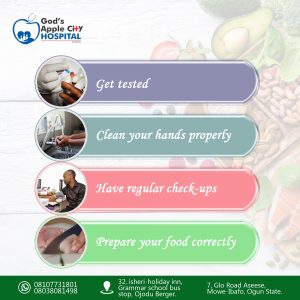
8. Get tested
Getting yourself tested is an important step in knowing your health status, especially when it comes to HIV, hepatitis B, sexually-transmitted infections (STIs) and tuberculosis (TB). Left untreated, these diseases can lead to serious complications and even death. Knowing your status means you will know how to either continue preventing these diseases or, if you find out that you’re positive, get the care and treatment that you need. Go to a public or private health facility, wherever you are comfortable, to have yourself tested.
9. Clean your hands properly
Hand hygiene is critical not only for health workers but for everyone. Clean hands can prevent the spread of infectious illnesses. You should handwash using soap and water when your hands are visibly soiled or handrub using an alcohol-based product.
10. Have regular check-ups
Regular check-ups can help find health problems before they start. Health professionals can help find and diagnose health issues early, when your chances for treatment and cure are better. Go to your nearest health facility to check out the health services, screenings and treatment that are accessible to you.
11. Prepare your food correctly
When buying food at the market or store, check the labels or the actual produce to ensure it is safe to eat.
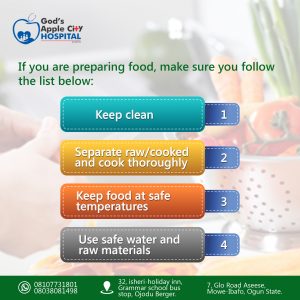
If you are preparing food, make sure you follow the Five Keys to Safer Food:
(1) keep clean
(2) separate raw and cooked
(3) cook thoroughly
(4) keep food at safe temperatures
(5) use safe water and raw materials.





